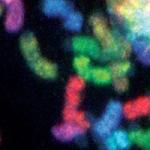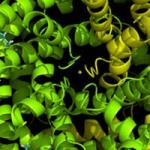
Rajula Elango Alleva, Ph.D.
Investigator
Genome Integrity & Structural Biology Laboratory / Stalled Replication Repair Group
NIEHS
Research Topics
Rajula Alleva Elango, Ph.D., leads the Stalled Replication Repair Group in the NIEHS Genome Integrity and Structural Biology Laboratory, and she holds a secondary appointment in the institute’s Epigenetics and Stem Cell Biology Laboratory. Her group works to track the molecular fate of DNA-protein crosslinks (DPCs), which are deleterious DNA lesions where a protein is covalently linked to a DNA strand.
DNA damage can foster genomic instability, which is implicated in the origin and progression of several disorders including neurodegeneration, premature aging, and some types of cancers. A common cause of genomic instability is the stalling of replication forks at sites of DNA damage, which can lead to replication stress. Therefore, studying the relationship between various DNA lesions and DNA repair is vital for understanding the origin and progression of these diseases. During her doctoral work, Elango sought to understand the mechanism of repair of one such commonly arising DNA lesion, a double-strand break (DSB). Using yeast, she studied how some DSBs are repaired by a deleterious DNA repair pathway called break-induced replication. Break-induced replication repair is implicated in the repair of broken replication forks and eroded telomeres.
During her postdoctoral research, she continued her pursuit of understanding how DNA lesions are repaired using a site-specific replication fork stalling reporter. Using mouse embryonic stem cells, she showed that the SLX4/XPF endonuclease is required for the processing and repair of stalled replication forks. She also uncovered a novel role for the Fanconi anemia protein SLX4/XPF in the repair of DPCs.
In her independent research group, she is interested in understanding how DPCs are recognized, processed, and repaired in mammalian cells. Elango will adapt state-of-the-art high throughput sequencing techniques and genetic engineering technologies to track the molecular intermediates formed during the repair of DPCs. This will allow her group to answer unique questions with a high level of resolution and precision. Since DPCs are routinely formed from exposure to chemical and environmental stressors, unraveling the mechanism of repair of DPCs can have a global impact on human health.
Biography
Elango received her Ph.D. from the University of Iowa in 2017. She worked under the mentorship of Anna Malkova, Ph.D., to unravel the mechanism of a deleterious repair pathway called break-induced replication. She then completed her postdoctoral training under the supervision of Ralph Scully, Ph.D., at Beth Israel Deaconess Medical Center/Harvard Medical School, where she studied the role of a structure-specific endonuclease called SLX4/XPF in the repair of stalled replication forks. She joined NIEHS as a Tenure-Track Investigator in 2024.
Related Scientific Focus Areas


Molecular Biology and Biochemistry
View additional Principal Investigators in Molecular Biology and Biochemistry



This page was last updated on Monday, April 29, 2024